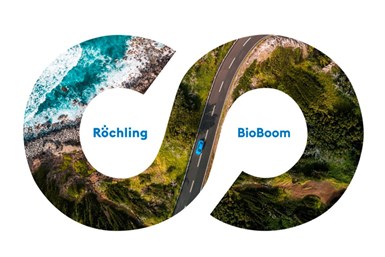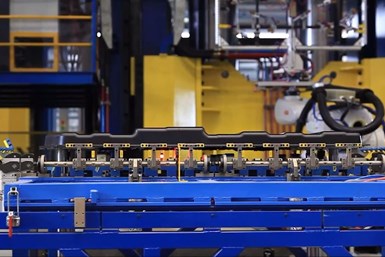Roechling Touts New Bioplastic
Green material generates 90% fewer CO2 emissions than its petroleum-based counterparts
Germany’s Roechling Automotive is taking a greener approach with its products.
To this end, the company has developed a new bioplastic that is made from at least 90% renewable materials, including sugar cane and sugar beet. In the future, Roechling also plans to use cellulose.
The supplier claims the new material is the first patented polylactide (PLA)-based biopolymer in the industry with such a sustainable makeup.
Boom Goes the Plastics
Dubbed BioBoom, the bio-plastic can be used in place of polyester and other petroleum-based PLAs as well as conventional polystyrene (ABS), polyolefins (such as PP) and polyamides (PA6) across a wide variety of components.

Roechling claims 70% fewer greenhouse gas emissions are emitted during the material’s manufacturing process compared with PP. The savings reaches nearly 90% versus PA6.
If BioBoom was used in place of all the petrochemical plastics in an average midsize car, the supplier calculates that CO2 manufacturing emissions could be cut by more than 1,100 lbs per vehicle.
More Benefits
The bioplastic also offers “significant improvements” in thermal stability and chemical resistance over standard PLA, according to the supplier. Other performance properties are said to be the same or better as conventional materials.

(Image: Roechling)
Adding talc, glass or wood fibers allows the material to be used in complex shapes.
Roechling notes that it sources the material from readily available and “reasonably priced” raw materials. Moreover, the company claims, there is “no effect on the food chain, because most of the materials come from production for industrial purposes.”
Initial Applications
BioBoom can be used across most of Roechling’s product portfolio, including underbody, engine compartment and interior components.
The company currently is working on applications for active grille shutters, air intake ducts, cowl grilles, exterior grilles and filter cases.
The company expects to sign its first OEM production contract for the material later this year. Negotiations also are underway with at least one other carmaker, according to the supplier.
What’s Next?
BioBoom is the first in a wave of next-generation environmentally friendly materials that Roechling is planning.
The company aims to be the leading supplier of automotive bio-plastics and other recycling materials by 2035.
“We believe the circular economy will become a reality in the next decade,” says Roechling Automotive CEO Hanns-Peter Knaebel. "With our bioplastics, we are bringing a sustainable solution to the market that originates from a completely self-controlled supply chain—from renewable resources to the automobile manufacturers. We are not waiting for regulations."
RELATED CONTENT
-
On Audi and Volvo's Green Initiatives, Bentley Design and more
Audi takes to the river to reduce plastic waste, Volvo focuses on a new category of consumers, Bentley once used a Bob Ross-approach during styling development, why Ford’s BlueOval City is the past brought to today, and some new terms that you should keep in mind
-
Let’s Go Ride a Bike
Bicycling in Denmark is, to put it mildly, a way of getting to point A to point B far more often than one might imagine (assuming that one isn’t in that country): according to the Cycling Embassy of Denmark, 90 percent of Danes own a bike.
-
Plastics: The Tortoise and the Hare
Plastic may not be in the news as much as some automotive materials these days, but its gram-by-gram assimilation could accelerate dramatically.










